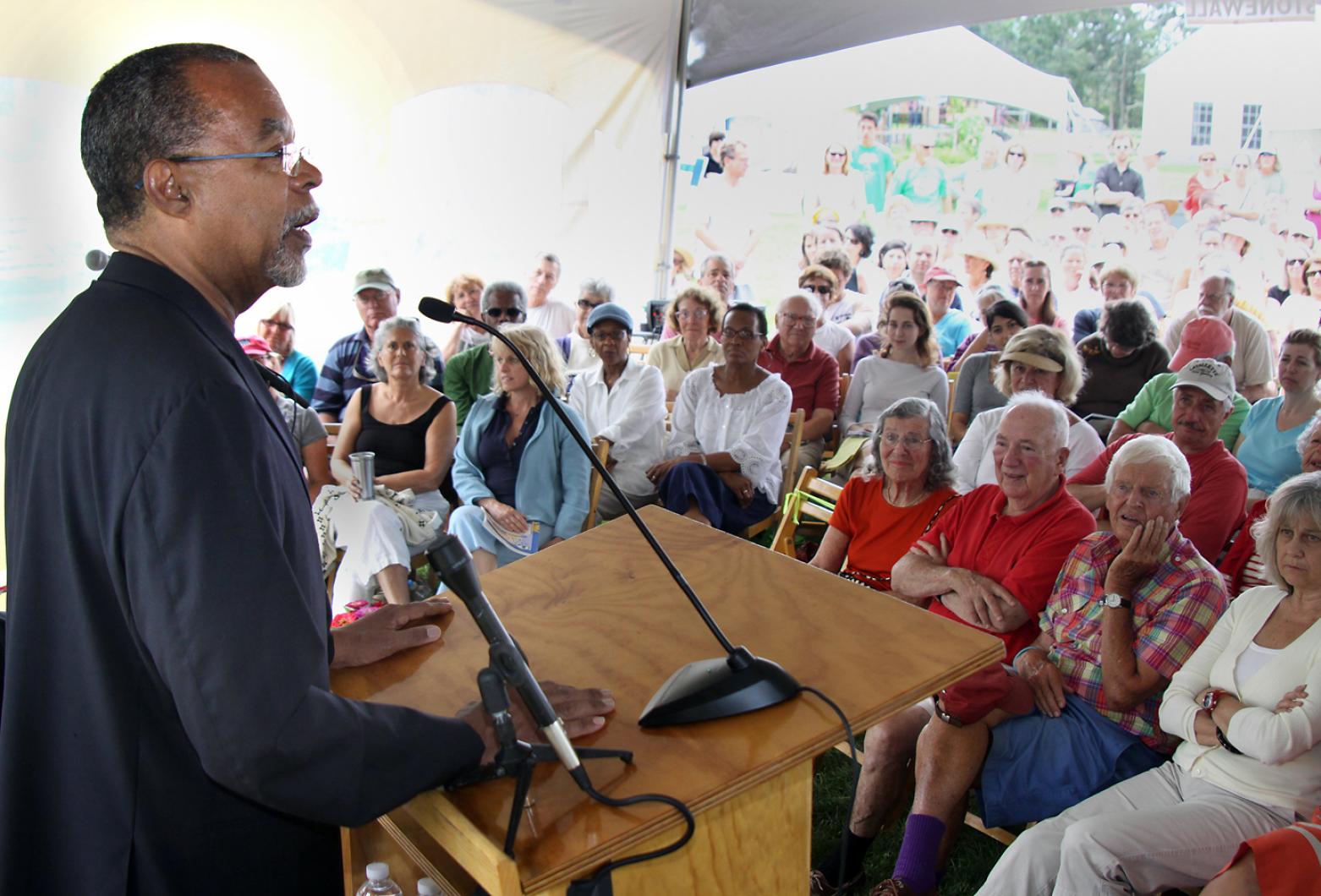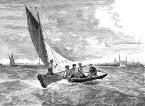Nobel prize-winning economist Robert Solow had the overflow crowd roaring with laughter from the very start of his introduction of Henry Louis Gates Jr. at the Martha’s Vineyard Book Festival on Sunday.
“It’s not often,” he deadpanned, “that you get the chance to introduce a deserving but obscure scholar . . . .”
And people say Americans don’t understand irony.
For decades now, Skip Gates has been one of the country’s best-known and most versatile intellectuals. And for the past couple of weeks, ever since he was arrested in his own home in Cambridge, his name has been everywhere in the news.
First the incident itself, what some consider to be racial profiling. Then President Obama’s comment that the police had acted “stupidly.” Then the right-wing backlash, the liberal defense and the peace-making few beers shared between the professor, the cop and the President at the White House. Even a debate over whether the beer brands they drank were sufficiently patriotic.
(For the record, the professor drank Sam Adams. Not, as widely reported, Jamaican Red Stripe.)
No, obscure is not a descriptor of Professor Gates. It is true, however, that all the brouhaha has had something of an obscuring effect, as evidenced by the fact that even Professor Solow almost forgot to mention the real reason for his appearance at the Chilmark festival — to promote his new book, In Search of Our Roots.
Maybe some subtle understanding of why the Gates case became such a cause celebre will emerge in time. Right now, though, even the professor confesses he is at a loss to fully understand it.
But the debate so far has been pretty superficial and polarizing — two other words which do not describe the author.
In fact, Professor Gates now wants to make a documentary, “an even-handed, nuanced thing” from both the point of view of the police and of people (not including himself) who believe they have been victims of racial profiling, “so that people can understand how you can have two completely valid, different sets of impressions about the same event.”
Nuance, that’s what’s been missing. And that was what those who attended his talk on Sunday got from Skip Gates.
He did not come across as an angry black man, but as a wry and funny one. The cop who busted him, Sgt. James Crowley, was no racist redneck either, apparently, but a wry and funny guy too.
“This is not a joke,” Professor Gates told his audience. “I mean, we really hit it off at the White House.
“I said to him: ‘I would have sworn you were six feet eight inches tall.’
“And he said: ‘I used to be. I’ve lost two or three feet in the last two weeks’
“How can you be mad at a guy like that?” he said.
He wants to know Sergeant Crowley better. Maybe a family dinner. Maybe a baseball or basketball game.
It has been a stressful couple of weeks. Professor Gates has not been back to his Cambridge home since the arrest and the university has recommended he move house. He has been forced to shut down his public e-mail because of “crazy, wacko messages like ‘you’re a racist and should die.’ ” He has had to change his phone numbers, which were published in the police report. There have been bomb and death threats.
But nor did he want to overstate his trauma. He was in jail for four hours, not four weeks, months or years. Unlike so many black and brown victims of racial profiling in this country, he had the best lawyers — Charles Ogletree and Alan Dershowitz.
And he had this refuge, Martha’s Vineyard. No intrusive media here, just supportive friends who had “come by the house... brought me food . . . asked me to get Barack’s autograph . . . .”
“I think the Vineyard is the most integrated community I’ve ever experienced,” he said. “That’s why I like it here. It is racial heaven for me.”
If Professor Gates’s arrest and the ensuing controversy show that issues of race remain “profoundly deep” in this country, his life story shows how complex they are.
In June 1960, he told the Chilmark crowd, when he was nine years old, he “fell in love” with genealogy, having attended the funeral of his grandfather, Edward St. Lawrence Gates, born in 1879.
Afterwards, with his father, he viewed a scrapbook kept by his grandfather, which contained a newspaper obituary dated Jan. 6, 1888, about the passing of an “estimable colored woman,” Jane Gates.
She was his grandfather’s grandmother, and her child was fathered by a white man “who we now know was an Irishman.”
It’s not such an uncommon thing, of course. White male desire for black women resulted in a lot of mixed race children. But even farther back in time — more than 300 years ago — Professor Gates’s DNA reveals, was a rarer coupling.
“I, ladies and gentlemen, am one of the five per cent of African American people descended from a woman who slept with a black man who was a slave,” he said.
That was in 1661.
And on his father’s side, he carries a DNA marker linking his forebears to an Irish king.
“Eight per cent of all men in Ireland are descended from the same dude,” he said. “All I can say is, it’s good to be the king.”
The upshot of it all? He believes he is distantly related to Sergeant Crowley.
In his talk, Professor Gates related several other such remarkable racial histories, all made knowable now by a combination of historical records and modern DNA analysis. That, in essence, is what his book and his previous two PBS documentary series are about — tracing histories back to Africa and the surprising other places they go.
Between 1514, when the first records began of slave shipments across the Atlantic, and 1867, 12.5 million Africans were put on boats. About 15 per cent of them died, but more than about 10 million survived the passage, and some 450,000 came to the United States (most of the rest went to the West Indies and Brazil).
“The day Thomas Jefferson sat down to write the Declaration of Independence, 75 per cent of our ancestors had already come to the United States,” he said.
By 1820, 99 per cent of them were here.
“So African Americans are as American as apple pie.”
Of course, many still are impoverished in America.
He noted that since Dr. Martin Luther King was killed in April 1968, the black middle class has quadrupled by some measures. But the percentage of black children living at or below the poverty level remained essentially the same, at around 38 per cent.
“In other words, we have two classes within the black community. The black ‘haves,’ who are perpetuating themselves and the black ‘have nots,’ who are perpetuating themselves,” he said.
And affirmative action policies which had served as a “class escalator” for some black people, now served as a way to perpetuate their class position.
“I think we need a class-based affirmative action. I grew up in the hills of West Virginia with poor white people and I can testify from my own experience the culture of poverty is color-blind,” Professor Gates said.
Now, there’s a view that should further fuel the current debate within the black community about the relative importance of race and class as determinants of social advancement.
No doubt it will be further fueled by Professor Gates’s upcoming PBS series. Having done African-American Lives in the previous two series, he is adopting what he calls the Noah’s ark approach this time.
The new series, Faces in America, will explore the histories of Americans from various other backgrounds — Asian, Hispanic, Catholic, Jewish, Arab, Native American and West Indian.
Yesterday,” he said, “I revealed Meryl Streep’s ancestry and her DNA to her in New York and last Sunday in L.A. I revealed Eva Longoria’s.
“I hope to make just a small contribution in how we tell the great narrative of the American people.
Not from the point of view of one ethnic group or one social class, but from the point of view of the great rainbow coalition of us all.”
So spoke a genuinely post-racial thinker, to a large post-racial crowd on a small post-racial Island.
Now, if only the rest if the country can catch up.







Comments (13)
Comments
Comment policy »